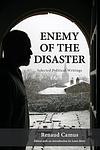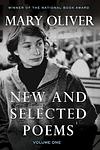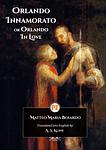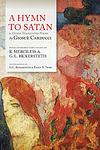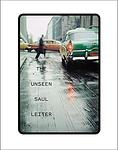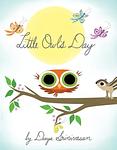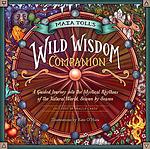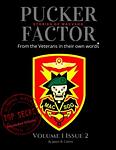The Greatest Italian Books of All Time
Click to learn how this list is calculated.
This list represents a comprehensive and trusted collection of the greatest books. Developed through a specialized algorithm, it brings together 300 'best of' book lists to form a definitive guide to the world's most acclaimed books. For those interested in how these books are chosen, additional details can be found on the rankings page.
Genres
Countries
Date Range
Reading Statistics
Click the button below to see how many of these books you've read!
Download
If you're interested in downloading this list as a CSV file for use in a spreadsheet application, you can easily do so by clicking the button below. Please note that to ensure a manageable file size and faster download, the CSV will include details for only the first 500 books.
Download-
126. Selected Writings by Salvatore Quasimodo
"Selected Writings" is a compilation of works by a Nobel Prize-winning poet, which showcases the breadth and depth of his literary contributions. The collection spans various phases of his career, offering readers a glimpse into his evolution as a writer. Known for his lyrical and evocative style, the author's poetry often reflects on themes of war, human suffering, and the search for meaning in a fragmented world. His work is deeply rooted in the classical tradition, yet it also incorporates modernist elements, illustrating a unique fusion of past and present. This anthology not only highlights the poet's technical mastery and emotional resonance but also his engagement with the cultural and historical upheavals of his time.
-
127. Selected Poems by Giuseppe Ungaretti
The collection "Selected Poems" is an anthology of works by a renowned 20th-century poet, offering a profound exploration of themes such as the fragility of life, the horrors of war, and the search for meaning. The poet's concise and evocative style, characterized by its economy of language and vivid imagery, reflects his experiences as a soldier during World War I and his subsequent meditations on existence and mortality. Drawing on influences from the Hermetic tradition, these poems are celebrated for their ability to capture the essence of human emotion and the transient beauty of the world with a few, carefully chosen words, leaving a lasting impact on the reader.
-
128. Orlando Innamorato by Matteo Maria Boiardo
The book is an epic poem that blends history, myth, and chivalric romance, recounting the adventures of its eponymous hero, Orlando, a knight of Charlemagne's court. Set against the backdrop of the war between Charlemagne's Christian paladins and the Saracen army that has invaded Europe, the narrative weaves a complex tapestry of love, valor, and enchantment. The protagonist, driven by his unrequited love for the beautiful Angelica, faces numerous trials and battles, encountering wizards, mythical creatures, and various magical artifacts. The poem is notable for its rich interplay of fantasy and reality, as well as its influence on later literature, particularly in the development of the Renaissance chivalric epic.
-
129. The She Wolf And Other Stories by Giovanni Verga
"The She Wolf and Other Stories" is a collection of vivid and emotionally intense short stories that delve into the lives of peasants and fishermen in 19th-century Sicily. The narratives, characterized by their realism and concise prose, explore themes of poverty, passion, and the struggle for survival in a changing world. The titular story, "The She-Wolf," stands out as a powerful tale of a fiercely independent and manipulative woman who embodies both the allure and the dangers of untamed nature. Through these stories, the book offers a window into the harsh realities of rural Sicilian life, highlighting the human condition and the social dynamics of the time.
-
130. Hymn To Satan by Giosué Carducci
The poem in question is a controversial and iconoclastic work that pays homage to Satan as a symbol of rebellion and human progress. Through a series of vivid and provocative images, the poem challenges traditional religious and moral beliefs, praising Satan as the embodiment of reason, beauty, and the force that has spurred humanity to break free from the chains of ignorance and superstition. The work reflects the author's critical view of the Church and his admiration for the spirit of the Renaissance and the Enlightenment, celebrating the pursuit of knowledge and the liberation of the human spirit.
-
131. Sonnets And Madrigals by Michelangelo Buonarroti
"Sonnets and Madrigals" is a collection of deeply personal and reflective poetry by one of the Renaissance's most iconic figures, known primarily for his monumental contributions to art and architecture. The poems reveal a lesser-known side of the artist's creative genius, exploring themes of love, beauty, spirituality, and human emotion. Through the structured elegance of sonnets and the lyrical flow of madrigals, the poet delves into the complexities of the human condition, offering insights into his own inner life and the intellectual currents of his time. The work stands as a testament to the multifaceted talent of an individual who could express profound ideas not only through visual mediums but also through the power of the written word.
-
132. The Wine Dark Sea by Leonardo Sciascia
In "The Wine Dark Sea," readers are presented with a collection of short stories that delve into the complexities of Sicilian life, exploring themes of justice, truth, and the human condition. The narrative weaves through tales of ordinary people confronted with extraordinary situations, often involving crime and moral dilemmas. The author's sharp observations and subtle irony highlight the intricate relationship between the individual and the often-oppressive societal structures, painting a vivid picture of a land steeped in beauty and contradiction, where the line between right and wrong is as blurred as the horizon on the titular wine-dark sea.
-
133. Saul by Vittorio Alfieri
"Saul" is a dramatic tragedy that unfolds in ancient Israel, focusing on the eponymous King Saul, who is tormented by jealousy and an obsession with the young David, the future king. The play delves into themes of power, madness, and divine will, as Saul's mental state deteriorates and his kingdom falls into chaos. His tragic flaw leads him to confrontations with his own family, his people, and ultimately, his downfall, as he grapples with the loss of God's favor and the rise of his successor. The narrative is a powerful exploration of human weakness and the destructive potential of unchecked emotions.
-
134. Equal Danger by Leonardo Sciascia
In a society where political corruption and disillusionment are rampant, a series of murders targeting high-ranking officials sends shockwaves through the establishment. A detective, known for his intelligence and integrity, is assigned to the case, only to find himself entangled in a web of intrigue that blurs the lines between justice and power. As he delves deeper into the investigation, he confronts the existential absurdity of a system that seems to protect the very forces it should be fighting against, leading to a climactic resolution that questions the very nature of truth and the role of law in a flawed society.
-
135. Day Of The Owl by Leonardo Sciascia
This novel delves into the murky world of Sicilian society, where the Mafia's influence permeates every level. When a businessman is murdered, the investigation is met with a wall of silence, indicative of the fear and complicity that hampers the pursuit of justice. The protagonist, a determined police captain, faces numerous obstacles as he attempts to unravel the complex web of connections that shield the true culprits. His quest exposes the deep-rooted corruption and the challenges of confronting an entrenched criminal organization that operates within a code of silence and intimidation.
-
136. Selections by Petrarch
"Selections" is a compilation of writings from a prominent Italian scholar and poet of the early Renaissance, known for his humanist contributions and lyrical poetry. The book encompasses a range of his works, including personal letters, philosophical treatises, and perhaps most famously, a series of sonnets dedicated to his idealized love, Laura. These writings reflect the author's deep engagement with classical antiquity, his introspective examination of human emotions, and his influence on the development of vernacular literature. His exploration of individual experience and expression of personal longing mark a significant departure from the medieval traditions of the time, positioning him as a forerunner of Renaissance humanism.
-
137. Lyric Poems by Petrarch
"Lyric Poems" is a collection of deeply emotional and introspective poetry that delves into the themes of love, desire, and beauty, often through the lens of the author's infatuation with an idealized woman. The poems are characterized by their elegant and refined language, reflecting the poet's classical learning and his role in the early Renaissance humanist movement. The work is significant for its use of the sonnet form, which the poet perfected and popularized, influencing generations of writers. The poems oscillate between joy and despair, capturing the complexities of the human heart and the poet's own intellectual and emotional journey.
-
138. Odes And The Graces by Ugo Foscolo
"Odes and the Graces" is a collection of lyric poetry that delves into themes of love, beauty, and classical antiquity, reflecting the author's deep appreciation for the Hellenistic cultural heritage. The poems are characterized by their passionate and sometimes melancholic tone, as they explore the transient nature of life and the enduring power of art. The poet's reverence for the ancient world is evident in his allusions to mythological figures and the Graces, who symbolize the giving of charm and beauty, serving as an inspiration for the pursuit of intellectual and aesthetic ideals in a world marked by political turmoil and change.
-
139. Essays And Dialogues by Giacomo Leopardi
"Essays and Dialogues" is a collection of philosophical writings that delve into the author's musings on the human condition, society, and the nature of happiness. The work is known for its profound pessimism and critical examination of the Enlightenment's optimistic view of progress. Through a series of essays and fictional conversations, the author explores themes such as the limitations of human knowledge, the inevitability of suffering, and the fleeting nature of pleasure. The text is a reflection of the author's erudition and his deep engagement with classical literature, which he uses to articulate a vision of life that is at once bleak and deeply insightful, challenging readers to confront the more somber aspects of existence.
-
140. The New Life by Dante Alighieri
"The New Life" is a prose work that combines both poetry and an autobiographical narrative to explore the themes of love and spiritual longing. The text recounts the author's intense love for a woman named Beatrice, whom he first sees at a young age and becomes enamored with, despite their minimal interaction. Her sudden death plunges him into a state of grief and prompts a profound journey of philosophical and theological inquiry. The work is a meditation on the nature of love, its connection to the divine, and the transformative power it holds. Through a series of poems and reflective prose passages, the author examines the impact of this idealized and unattainable love on his life and work, ultimately finding a new understanding of the relationship between earthly passion and eternal life.
-
141. On The Historical Novel by Alessandro Manzoni
The book in question is a critical examination of the historical novel as a literary genre, exploring the challenges and responsibilities of blending historical facts with fictional narrative. The author delves into the intricacies of accurately representing historical events and characters while crafting a compelling story that remains true to the era it depicts. Through a series of essays, the work discusses the importance of historical context, the role of the author's perspective, and the balance between didacticism and entertainment in creating novels that not only depict the past but also resonate with contemporary readers. The text serves as both a guide for writers of historical fiction and a critique of the genre, offering insights into the ethical and artistic considerations involved in writing about history.
-
142. Notebooks by Leonardo da Vinci
The book is a compilation of writings and sketches from one of history's most brilliant minds, offering a window into the intellectual pursuits and creative process of the Renaissance polymath. It encompasses a wide array of subjects, from anatomy to hydraulics, from painting to engineering, revealing the author's insatiable curiosity and his systematic approach to observation and inquiry. The collection is not only a testament to the author's genius but also a source of inspiration and insight into the fusion of art and science during the Renaissance period.
-
143. Maia by Gabriele D'Annunzio
"Maia" is a lyrical exploration of sensuality and artistic creation, following the journey of a young poet who becomes entranced by the beauty of a woman named Maia. As the poet becomes increasingly obsessed with his muse, he delves into a world of aesthetic pleasure and poetic inspiration, seeking to capture the essence of Maia's allure through his verses. The narrative weaves a tapestry of passion and beauty, reflecting on the nature of desire and the intertwining of life and art, ultimately questioning the boundaries between reality and the ideal, and the cost of artistic obsession.
-
144. Last Letters Of Jacopo Ortis by Ugo Foscolo
The book is a poignant epistolary novel that delves into the emotional turmoil of a young Italian intellectual, torn between his passionate love for a woman and his despair over the political situation in his homeland. As he grapples with unrequited love and the loss of his country's freedom following its annexation by a foreign power, the protagonist's letters reveal his deepening melancholy and his philosophical reflections on love, death, and patriotism. The novel, rich in its exploration of human emotions and national identity, ultimately leads to a tragic conclusion, reflecting the author's own disillusionment with the political climate of his time.
-
145. Barbarian Odes by Giosué Carducci
"Barbarian Odes" is a collection of lyric poetry that celebrates the beauty of the Italian landscape, the richness of its history, and the poet's own personal experiences and emotions. The work is infused with classical references and a passionate spirit of nationalism, reflecting the poet's reverence for the ancient past and his aspirations for Italy's cultural and political rejuvenation. The odes are characterized by their bold, energetic style and their embrace of life's sensual pleasures, while also contemplating themes of love, nature, and the passage of time. This collection represents a significant contribution to the canon of Italian literature, blending the classical tradition with a modern sensibility.
-
146. Stories And Recollections by Umberto Saba
"Stories and Recollections" is a collection of autobiographical prose by an Italian writer, offering a window into the author's life and times. The book weaves together a series of personal anecdotes, reflections, and narratives that span the author's childhood, adolescence, and adulthood. Through these stories, the reader gains insight into the writer's Jewish heritage, his experiences in Trieste, and the broader cultural and historical context of early 20th-century Europe. The work is characterized by its intimate tone and the author's candid exploration of identity, family, and the complexities of human relationships.
-
147. The Buried Harbour by Giuseppe Ungaretti
"The Buried Harbour" is a poetic exploration of memory, loss, and the passage of time, as the author delves into the depths of his past, unearthing the emotional landscapes of his experiences. Through a series of evocative poems, the reader is taken on a journey that navigates the complex waters of human existence, intertwining personal reflections with universal themes. The work serves as a metaphorical excavation of a hidden harbor, a place where the author's deepest thoughts and memories are anchored, revealing the enduring power of poetry to uncover the submerged truths of the soul.
-
148. T Zero by Italo Calvino
"T Zero" is a collection of complex, imaginative stories that blend scientific concepts, mathematical structures, and literary experimentation. The work challenges the boundaries of time, space, and narrative convention, weaving together a tapestry of tales that explore the nature of reality, causality, and human perception. Through a series of thought-provoking vignettes, the book delves into the paradoxes of existence, employing a playful yet profound use of language to question the very framework of storytelling and the universe it attempts to describe.
-
149. As A Man Grows Older by Italo Svevo
The novel delves into the life of an aging, unremarkable bureaucrat who becomes entangled in a love affair with a much younger woman. As he grapples with his fading youth and the disappointments of his mediocre career, his romantic aspirations lead to a series of comic and poignant misadventures. The narrative explores themes of self-deception, the disillusionment of middle age, and the human struggle to find meaning and connection in a modern world that often seems indifferent to individual desires and fears.
-
150. Seven Brief Lessons on Physics by Carlo Rovelli
This book is a succinct and enlightening introduction to the fundamental concepts of modern physics, presented in seven easy-to-understand lessons. The lessons cover topics such as general relativity, quantum mechanics, the architecture of the cosmos, particles, quantum gravity, probability, time, and the human perspective on these scientific wonders. The book aims to bridge the gap between the complex world of modern physics and the general public's understanding, making the often intimidating subject accessible and engaging for all readers.
Reading Statistics
Click the button below to see how many of these books you've read!
Download
If you're interested in downloading this list as a CSV file for use in a spreadsheet application, you can easily do so by clicking the button below. Please note that to ensure a manageable file size and faster download, the CSV will include details for only the first 500 books.
Download